|
|
|
Sort Order |
|
|
|
Items / Page
|
|
|
|
|
|
|
| Srl | Item |
| 1 |
ID:
133937
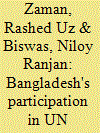

|
|
|
|
|
| Publication |
2014.
|
| Summary/Abstract |
This article argues that the participation of the Bangladeshi armed forces in UN peacekeeping has produced positive benefits for civil-military relations in the country and that this process is best explained by reference to concordance theory, as propagated by Rebecca Schiff. Unlike traditional theories of civil-military relations, concordance theory highlights dialogue, accommodation and shared values or objectives held by the military, the political elites and society. We argue in this paper that peacekeeping has gradually emerged in Bangladesh as an issue where all three partners are converging and prone to hold similar views. This may have a profound impact upon Bangladeshi politics whereby the chances of military intervention in domestic politics will lessen. This paper helps in understanding the implications of Bangladesh's involvement in UN peace missions, an issue on which little work has been conducted until now despite the fact that it has important implications for both the Bangladesh state and its armed forces.
|
|
|
|
|
|
|
|
|
|
|
|
|
|
|
|
| 2 |
ID:
160556
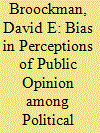

|
|
|
|
|
| Summary/Abstract |
The conservative asymmetry of elite polarization represents a significant puzzle. We argue that politicians can maintain systematic misperceptions of constituency opinion that may contribute to breakdowns in dyadic representation. We demonstrate this argument with original surveys of 3,765 politicians’ perceptions of constituency opinion on nine issues. In 2012 and 2014, state legislative politicians from both parties dramatically overestimated their constituents’ support for conservative policies on these issues, a pattern consistent across methods, districts, and states. Republicans drive much of this overestimation. Exploiting responses from politicians in the same district, we confirm these partisan differences within individual districts. Further evidence suggests that this overestimation may arise due to biases in who contacts politicians, as in recent years Republican citizens have been especially likely to contact legislators, especially fellow Republicans. Our findings suggest that a novel force can operate in elections and in legislatures: Politicians can systematically misperceive what their constituents want.
|
|
|
|
|
|
|
|
|
|
|
|
|
|
|
|
| 3 |
ID:
176566
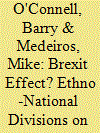

|
|
|
|
|
| Summary/Abstract |
The status of Northern Ireland has been at the heart of the Brexit impasse. Using semi-structured interviews of political elites and an original survey experiment administered to young people on both sides of the Irish border (N = 771), this study analyzes Brexit’s impact on identities and territorial attachments on the island of Ireland. The results demonstrate that political elites perceived that Brexit had greatly exacerbated intergroup tensions; whereas the survey experiment only identified a significant influence of Brexit on territorial attachment in the Republic of Ireland, and no significant effect of Brexit on attitudes was measured in Northern Ireland.
|
|
|
|
|
|
|
|
|
|
|
|
|
|
|
|
| 4 |
ID:
123882
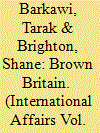

|
|
|
|
|
| Publication |
2013.
|
| Summary/Abstract |
How do we approach the subject of British grand strategy today? This article seeks a new approach to this question. It argues that there is a gap of grand strategic significance between actually-existing Britain and the Britain its political elites tend to imagine.
The colonial and imperial histories that helped constitute and still shape the contemporary United Kingdom have fallen through this gap. One consequence is a grand strategic vision limited to a choice of partner in decline - Europe or the US. Overlooked are the power political potentialities of post-colonial generations situated in multiple sites at home and abroad.
In search of this potential, we lay the conceptual basis for a strategic project in which the British 'island subject' is replaced by a globally networked community of fate: 'Brown Britain'. This entails reimagining the referent object of British strategy through diaspora economies, diverse histories and pluralized systems of agency.
What might such a post-colonial strategy entail for British policy? We offer initial thoughts and reflect on the often occluded social and political theoretic content of strategic thought.
|
|
|
|
|
|
|
|
|
|
|
|
|
|
|
|
| 5 |
ID:
171041
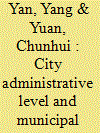

|
|
|
|
|
| Summary/Abstract |
This study focuses on the following important but often overlooked variable in studies investigating China’s cadre system: the city administrative level. Using a dataset covering Chinese municipal party secretaries from 2000 to 2017, this article finds that secretaries from sub-provincial cities are more likely to be promoted than those from prefecture-level cities. This result reveals that serving as a party secretary in sub-provincial cities may be a key step towards further promotion among those who become vice ministers at a young age. In addition, economic performance has a negligible effect on sub-provincial secretaries’ better promotion prospects, highlighting the existence of heterogeneity caused by the city administrative level in the promotion tournament.
|
|
|
|
|
|
|
|
|
|
|
|
|
|
|
|
| 6 |
ID:
080311
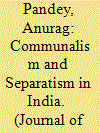

|
|
|
|
|
| Publication |
2007.
|
| Summary/Abstract |
Due to the rise and growth of the Bhartiya Janata Party (BJP) with its sister organizations in Indian politics, the existence of the Muslim political elite's communal attitude, acceptance of liberalized economic policy by India and the rise in mutual suspicion and hostile attitude among both Muslims and Hindus, India may witness a violent civil war between Hindus and Muslims in the future. The clashing political and economic interests and confronting attitude from both sides may lead them to be two different nations again. The spectre of Two Nations Theory may emerge once again.
|
|
|
|
|
|
|
|
|
|
|
|
|
|
|
|
| 7 |
ID:
129461
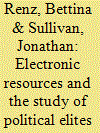

|
|
|
|
|
| Publication |
2013.
|
| Summary/Abstract |
Developments in the information society in Russia have led to the creation of an abundance of online primary texts by political actors and institutions. This article surveys a large selection of official electronic texts with the aim of encouraging more extensive use of online sources and easing researchers' navigation of Russian politicians' use of the internet. While the authors do not claim that online data can replace the insights gained from elite interviews, the article suggests that online texts could be used more extensively as a valuable addition to existing methods applied to the study of Russian political elites.
|
|
|
|
|
|
|
|
|
|
|
|
|
|
|
|
| 8 |
ID:
139276
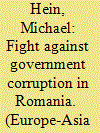

|
|
|
|
|
| Summary/Abstract |
The fight against political, especially government, corruption has dominated Romanian political discourse for many years. However, the vast majority of the political elite have continuously opposed the prosecution and conviction of defendants of corruption crimes. After a long constitutional conflict that seriously inhibited the fight against government corruption between 2006 and 2009, law enforcement agencies finally began to experience some success. Nevertheless, the extent of government corruption has remained consistently high. This article analyses the struggles that have occurred between 2004 and 2013 in the fight against government corruption in Romania and particularly examines the interplay between formal and informal factors in this field.
|
|
|
|
|
|
|
|
|
|
|
|
|
|
|
|
| 9 |
ID:
184111
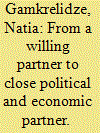

|
|
|
|
|
| Summary/Abstract |
This article explores EU political elites' images of Georgia and its evolution from 1991 to 2020. The analysis relies on the author’s 25 original interviews with EU political elites, including presidents, prime ministers and ministers of EU member states and EU commissioners, alongside primary documents. By triangulating between novel interview data, document analysis and statements by EU officials, this article unpacks EU perceptions of Georgia’s intentions, capabilities, threats and cultural status over a 30-year historical period. The study shows that three main images of Georgia have emerged over time in the eyes of EU and EU member states leaders: first, Georgia as a willing partner to the EU; second, Georgia as a political partner to the EU and third, Georgia as a close political and economic partner to the EU. This article, by studying the EU political elites’ images of Georgia, adds knowledge to the EU’s perceptions of external actors, which is an under-researched topic in the scholarship of images and perceptions in EU external relations. Moreover, it extends the literature on EU–Georgia relations, and helps to understand some of their peculiarities.
|
|
|
|
|
|
|
|
|
|
|
|
|
|
|
|
| 10 |
ID:
139260
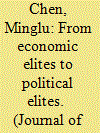

|
|
|
|
|
| Summary/Abstract |
The number of entrepreneurs in the system of People's Political Consultative Conferences (PPCC) has increased dramatically in the last two decades. Although the political importance of these local assemblies is usually dismissed, entrepreneur participation suggests a need for further investigation. Based on research on a city-level PPCC, this article seeks to interpret this phenomenon further. In the process of investigating private entrepreneurs' involvement in the PPCC, this article aims to re-examine the role of the local PPCC and to highlight private entrepreneur PPCC members' attitude to and expectations from the Party-state.
|
|
|
|
|
|
|
|
|
|
|
|
|
|
|
|
| 11 |
ID:
139259
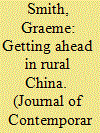

|
|
|
|
|
| Summary/Abstract |
This article will outline the politics and pathways of promotion among government officials working in a rural county in Anhui province and their attitudes towards elite status. It will analyze the implications these processes and pathways have for the operation of local government in rural China. Drawing on interviews and relationships spanning a ten-year period (2004–2013), this article primarily relies upon the personal experiences of colleagues and friends who have attempted to rise through the ranks of government and business in Benghai County, with varying degrees of success. While the article will focus on political elites, in Benghai it is impossible to separate business from politics. This article will delineate strategies adopted for career advancement and attaining elite political status, and the effects these strategies have on the relationship between political elites and ordinary cadres.
|
|
|
|
|
|
|
|
|
|
|
|
|
|
|
|
| 12 |
ID:
139261
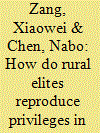

|
|
|
|
|
| Summary/Abstract |
Many scholars have shown that cadre status is associated with cadre earnings advantages in rural China. What is less clear from the published research is how political power is used by rural elites to generate personal gains. We narrow this knowledge gap by studying three main mechanisms whereby cadre privileges are reproduced in rural China. Using ethnographic data from three rural townships in Guangdong province, we show that local economies have been differentiated in the post-1978 era, leading to three different mechanisms with which village leaders in each of the three townships have maintained their earnings advantages respectively, i.e. local corporatism, informal bargaining and opportunistic parasitism. We predict that local corporatism will be the dominant model of the reproduction of cadre privileges in rural China.
|
|
|
|
|
|
|
|
|
|
|
|
|
|
|
|
| 13 |
ID:
089783
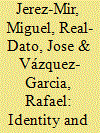

|
|
|
|
|
| Publication |
2009.
|
| Summary/Abstract |
European Union Integration and the process of political development and institution building are shaped by interactions between elites and masses. In their initial steps, scholars noted the Predominantly intergovernmental, elite-driven flavour of these processes (Inglehart 1970; Lindberg & Scheingold 1970). It has been during the last few years-as the process of European integration has deepened and the number of 'Europeanised' policy areas has expanded- that national arenas have also been increasingly concerned with European Union (EU) affairs,reinforcing the role of national elites and mass public opinion on European integration (Dalton & Eichenberg 1998).
|
|
|
|
|
|
|
|
|
|
|
|
|
|
|
|
| 14 |
ID:
106275
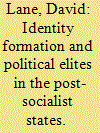

|
|
|
| 15 |
ID:
140775
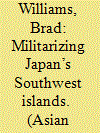

|
|
|
|
|
| Summary/Abstract |
This paper sheds light on a relatively underexplored aspect of Japan’s recent security changes by examining the subnational level where the impact has been far-reaching. It focuses on Japan’s maritime frontier zone: the Yaeyama Islands located at the southwestern end of the Japanese archipelago and administered as part of Okinawa Prefecture. It argues that while Yaeyama militarization has been primarily a national response to China’s portrayed assertiveness in the East China Sea, it has also been facilitated by the strategic actions of local political elites, in cooperation with sympathetic extra-local forces. Political elites from two islands, Yonaguni and Ishigaki, have been motivated primarily by diverging material and ideational factors. Yonaguni elites have viewed militarization largely through the prism of “compensation politics.” Their counterparts in Ishigaki have been driven by more ideological objectives, seeking militarization for deterrence purposes and otherwise transforming the island into a rightist breeding ground in defence of Japanese territory. Yaeyama militarization has not only diminished enthusiasm for seeking autonomy and enhancing economic security through microregional cooperation, but has also enhanced local-level insecurities while creating and exacerbating divisions.
|
|
|
|
|
|
|
|
|
|
|
|
|
|
|
|
| 16 |
ID:
178392
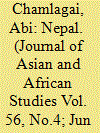

|
|
|
|
|
| Summary/Abstract |
The purpose of this article is to compare Nepal’s two Tarai/Madhesh Movements using the political opportunity structure theory of social movements. Tarai/Madhesh Movement I launched by the Forum for Madheshi People’s Rights in 2007 became successful as Nepal became a federal state. Tarai/Madhesh Movement II launched by the United Democratic Madheshi Front of the Tarai/Madheshi parties and the Tharuhat Joint Struggle Committee of the Tharu organizations failed as political elites disagreed about the need to create two provinces in the Tarai/Madhesh. While Tarai/Madhesh Movement II confirms that a social movement is more likely to fail when political elites align against it, Tarai/Madhesh Movement II refutes the theoretical proposition. Tarai/Madhesh Movement I suggests that the sucess of a social movement is more likely despite the alignment of political elites against it if its central demand consistently sustains the support of its constituents.
|
|
|
|
|
|
|
|
|
|
|
|
|
|
|
|
| 17 |
ID:
085000
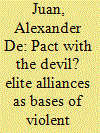

|
|
|
|
|
| Publication |
2008.
|
| Summary/Abstract |
This article aims at explaining religious conflicts on the basis of an elite-centered theoretical model. Violent movements can only pertain on the long run if political elites organize and coordinate them centrally. The same holds true for the religious dimension of many conflicts. Religious elites have to persuade the believers of the religious nature of their struggle. Hence, in many cases religious conflicts can be traced back to alliances of religious and political elites. The first try to protect their religious communities and hope to expand their religious influence. The latter try to use religion as a resource for mobilization
|
|
|
|
|
|
|
|
|
|
|
|
|
|
|
|
| 18 |
ID:
144076
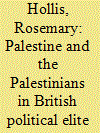

|
|
|
|
|
| Summary/Abstract |
This article examines how the Palestinians have been represented in British political elite discourse between 1915 and 2015 as an exploration into the role of such discourse in framing the identity and thence shaping the fate of a community or people seeking national independence. It also makes some observations about the significance of political violence or war in bringing about paradigm shifts in the discourse. The analysis reveals that the way the British depicted the Palestinian Arabs and their cause has changed over time, but at no point did the discourse identify independent statehood for the Palestinians as a central or stand-alone objective of policy.
|
|
|
|
|
|
|
|
|
|
|
|
|
|
|
|
| 19 |
ID:
099197
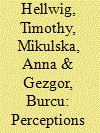

|
|
|
| 20 |
ID:
172198
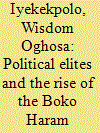

|
|
|
|
|
| Summary/Abstract |
What is the cause of Boko Haram insurgency in Nigeria? Studies on Boko Haram insurgency onset has largely emphasized economic poverty, religious ideology, and the historical north-south identity fractionalization. Some others which focus on Nigerian politics as the cause of the insurgency have largely analyzed how corrupt politicians have caused economic poverty and inequality which have resulted in grievances in northern Nigeria. While these studies have made invaluable contributions to the literature, this study begs to deviate from their emphasis by showing how political elites have mobilized and given political relevance to the Boko Haram group. This study specifically investigates the cause of the insurgency by adopting the state-centered approach which argues that insurgencies are caused by structural vulnerabilities in certain kind of states. In doing this, this study advances the following four propositions. Firstly, when factions of political elites compete for political power at the national level on identity basis, identity groups emerge at the subnational level in defense of these identities. Secondly, identity groups gain political relevance when factions of the political elites ascribe such relevance to them in the process of competing for political power. Thirdly, when a fundamentalist identity group becomes political relevant, it makes fundamental demands which spark antagonism between it and the political elites. Finally, insurgencies based on fundamentalist identity claims go unchecked in a partial democracy with political elites factionalized along identity lines.
|
|
|
|
|
|
|
|
|
|
|
|
|
|
|
|
|
|
|
|
|